The researchers discovered in Patagonia the fossil of a small mammal of the size of a mouse that rubbed the shoulders with dinosaurs and was previously unknown to the community of paleontologists. The announcement of this finding took place last week in an article published by the British Scientific Journal Proceedings of the Royal Society B.
The presor Yeutherium weighed between 30 and 40 grams and lived in the upper Cretaceous, about 74 million years ago. It is the smallest mammal never identified in this South American region.
The fossil consists of “a small piece of jaw with a molar and the crown and the root of two other molars,” Hans Puschel explains to the AFP, at the head of the team of scientists from the University of Chile and the Chilean Research Center of the Millennium nucleus.
A small herbivorous animal
The researchers identified him in the Valley of the Chinese River, a river in the Chilean region of Magallanes (South), about 3,000 kilometers south of Santiago.
The Yeutherium Pressor was, according to its discoverers, a mammal capable of putting eggs, such as the ornithorynque today, and bring their young in a pocket like kangarides or tsiraignas.
The shape of his teeth suggests that his diet consisted of relatively hard plant foods. Like the dinosaurs that lived at the same time as him, this little mammal disappeared at the end of the Cretaceous, about 66 million years ago.
Source: BFM TV


